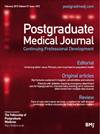Association between non-neoplastic bladder diseases and bladder cancer risk: insights from Mendelian randomization studies.
IF 3.6
4区 医学
Q1 MEDICINE, GENERAL & INTERNAL
引用次数: 0
Abstract
PURPOSE Our aim is to explore the relation between non-neoplastic bladder diseases and bladder cancer (BC) from a genetic level utilizing Mendelian randomization (MR). METHODS Single nucleotide polymorphisms (SNPs) related to cystitis, bladder stones, and neuropathic bladder were gathered from the IEU genome-wide association studies database. Quality control on SNPs was performed via stringent screening criteria. The relation between non-neoplastic bladder diseases and BC risk was evaluated using inverse-variance weighted, MR-Egger, weighted median, simple mode, and weighted mode methods. Cochran's Q test was conducted to assess the heterogeneity of SNPs; in addition, the MR-Egger intercept test was employed to examine the horizontal pleiotropy of SNPs. Exposure and outcomes were validated using a validation database. Finally, BC was used as the exposure and non-neoplastic bladder diseases as the outcome to evaluate reverse causality. RESULTS The outcomes showcased that genetically predicted cystitis is significantly correlated to a raised risk of BC (inverse-variance weighted: odds ratio [95%] = 1.1737 [1.0317, 1.3352], P = .0149), consistent with the BC validation cohort in the MR analysis. Nevertheless, no causal relation was found between bladder stone and neuropathic bladder with BC risk (P > .05). In this study, sensitivity analysis indicated no heterogeneity or horizontal pleiotropy. CONCLUSION The study presents proof of a genetic-level causal relation between cystitis and increased BC risk, while bladder stones and neuropathic bladder do not show similar associations.非肿瘤性膀胱疾病与膀胱癌风险之间的关系:孟德尔随机研究的启示。
方法从 IEU 全基因组关联研究数据库中收集与膀胱炎、膀胱结石和神经性膀胱相关的单核苷酸多态性(SNPs)。通过严格的筛选标准对 SNPs 进行了质量控制。采用逆方差加权法、MR-Egger 法、加权中位法、简单模式法和加权模式法评估了非肿瘤性膀胱疾病与 BC 风险之间的关系。采用 Cochran's Q 检验来评估 SNPs 的异质性;此外,还采用 MR-Egger 截距检验来检查 SNPs 的水平褶积性。使用验证数据库对暴露和结果进行了验证。结果结果显示,遗传预测的膀胱炎与膀胱癌风险的增加显著相关(逆方差加权:几率比 [95%] = 1.1737 [1.0317, 1.3352],P = .0149),与 MR 分析中的膀胱癌验证队列一致。不过,膀胱结石和神经性膀胱炎与 BC 风险之间没有因果关系(P > .05)。结论:该研究证明了膀胱炎与 BC 风险增加之间存在遗传层面的因果关系,而膀胱结石和神经性膀胱并没有显示出类似的关联。
本文章由计算机程序翻译,如有差异,请以英文原文为准。
求助全文
约1分钟内获得全文
求助全文
来源期刊

Postgraduate Medical Journal
医学-医学:内科
CiteScore
8.50
自引率
2.00%
发文量
131
审稿时长
2.5 months
期刊介绍:
Postgraduate Medical Journal is a peer reviewed journal published on behalf of the Fellowship of Postgraduate Medicine. The journal aims to support junior doctors and their teachers and contribute to the continuing professional development of all doctors by publishing papers on a wide range of topics relevant to the practicing clinician and teacher. Papers published in PMJ include those that focus on core competencies; that describe current practice and new developments in all branches of medicine; that describe relevance and impact of translational research on clinical practice; that provide background relevant to examinations; and papers on medical education and medical education research. PMJ supports CPD by providing the opportunity for doctors to publish many types of articles including original clinical research; reviews; quality improvement reports; editorials, and correspondence on clinical matters.
 求助内容:
求助内容: 应助结果提醒方式:
应助结果提醒方式:


